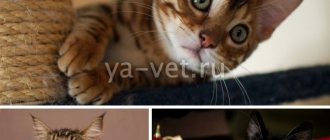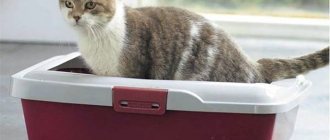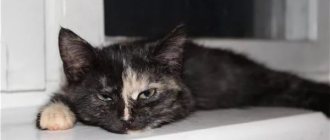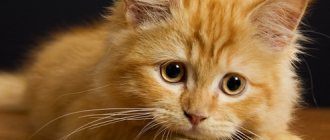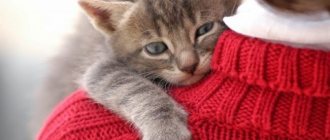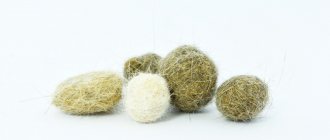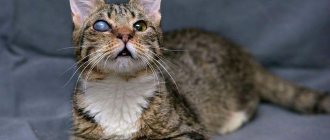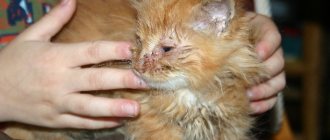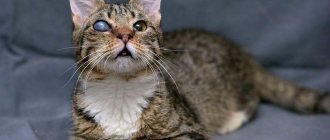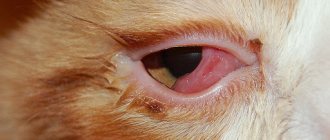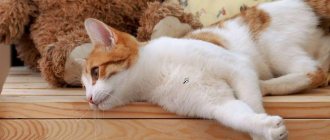Disruption of the digestive system in animals is not always a consequence of poisoning.
Diarrhea in a cat can occur due to disruption of the digestive system.
Liquid stool with mucus is an alarming symptom that the owner needs to pay attention to and take timely measures to improve the pet’s condition, otherwise irreversible consequences will develop.
Causes
Diarrhea in cats is always a consequence of ill health. It is important to determine the reasons why the animal’s intestines stop working normally.
Poor nutrition
Changing food, switching from liquid substances to dry granules and vice versa, feeding the animal from the owner’s table lead to disruption of digestive activity.
If a cat has unlimited access to food, this also does not have the best effect on the functioning of the liver and pancreas.
Cats fed a natural diet experience diarrhea more often than cats fed commercial food.
Store-bought food contains all the components necessary for proper growth, development and digestion. Dosing granules or pates is easy because the manufacturers have taken into account all the nuances.
When feeding a cat natural food, it is difficult to monitor the composition and dosage of the food. Diarrhea in an animal often occurs after overeating.
In kittens, diarrhea is observed when switching to food after mother's milk.
This reaction of the body does not last long; after a day, digestion is improved.
Milk protein intolerance
Most adult cats are intolerant to lactose, the protein in milk. After consuming dairy products, an adult animal may diarrhea. Natural products are given only to kittens.
Poor quality feed
Not all industrial feeds are of good quality. Some of them contain only protein and lack vitamins and other nutrients. This can negatively affect the digestion process.
For your pet, choose brands with a variety of compositions from trusted manufacturers. If the animal already has health problems, food is selected in consultation with a veterinarian.
Allergic reactions
Food allergies can cause diarrhea in a cat. The owner of the animal needs to monitor what foods the pet’s health worsens after. Such food is completely excluded from the diet.
Helminthiasis
Intestinal parasites violate the integrity of the mucous membranes, and their waste products lead to intoxication of the body. As a result, the animal develops chronic diarrhea.
Veterinarians recommend deworming pets at least 2 times a year.
Medicines prescribed by a veterinarian
When it comes to the question of how to treat diarrhea in a cat, only a veterinarian will provide qualified assistance. Listed below are the most common veterinary medications that can help relieve your pet's condition. Treatment using medication is recommended only in cases where the causes of this condition are known:
- For diarrhea, your cat should be given medications that help regulate intestinal microflora, for example, Linex.
- It is possible to cure intestinal and stomach disorders caused by the use of antibiotics with the help of Bifitrilak.
- The animal should be given a Smecta solution in the appropriate dosage.
In order to help a cat with an intestinal disorder, you need to remember the correct behavior on the first day and timely consultation with a veterinarian.
Diarrhea as a symptom of the disease
Diarrhea with mucus in a cat can occur due to diseases of the internal organs, infectious diseases, and gastritis.
Liver pathologies
Liver diseases are difficult to diagnose in the early stages. If diarrhea is accompanied by other alarming symptoms, it is necessary to send your pet for a full veterinary examination.
What happens to an animal if there are abnormalities in the liver:
- weight loss;
- lack of appetite;
- yellowing of the gums and whites of the eyes;
- thirst;
- diarrhea and vomiting.
The cat's urine darkens, and fluid begins to accumulate in the abdominal cavity.
Gastritis
Inflammation of the gastric mucosa is called gastritis. Symptoms of the disease in cats are not specific, they are similar to signs of general intoxication of the body:
refusal of food;- thirst;
- vomiting after eating;
- loose stool.
In a chronic course, the signs may be blurred, and the disease develops over several years.
Why does mucus appear in stool?
It is difficult not to see that a cat has mucus in its stool. Usually this phenomenon is immediately noticeable and looks like transparent or whitish impurities in the general stool. Sometimes there are not many of them, but sometimes the feces are completely covered with mucous secretions. In any case, this is an anomaly that may indicate pathologies that have arisen in the animal’s body.
© shutterstock
The appearance of mucus in stool can be caused by a number of reasons.:
- the presence of worms;
- viral or bacterial diseases;
- intolerance to certain foods;
- excessive overfeeding;
- metabolic failures;
- intestinal obstruction;
- stressful state (when changing place of residence or owners);
- food that is too fatty;
- incorrectly formulated diet or eating disorders;
- inflammatory processes in the digestive system;
- consequences of poisoning with bad food, chemicals or poisons;
- abrupt change of menu;
- allergy;
- decreased body resistance to diseases;
- reaction to certain drugs;
- wool in the stomach.
The reasons are so varied that it is almost impossible for an ignorant person to independently determine why a cat poops feces with mucus. But the fact that not everything is all right with the pet is obvious. In addition to the foreign impurities themselves, additional symptoms help to understand this.
Associated signs of an unhealthy pet
The following symptoms, which can appear with a number of diseases, should be a reason to worry about your cat::
- diarrhea with mucus may indicate an overdose of vitamins;
- flatulence and diarrhea often indicate food intolerance that has arisen, which will simply need to be excluded from the diet;
- lumps of mucus in liquid feces, nausea, weight loss, sometimes vomiting, and at the same time the cat often licks itself - chronic inflammation in any part of the digestive tract is possible;
- the feces have become greasy, bright yellow or greenish, vomiting, flatulence, nausea have appeared, appetite has noticeably increased - it’s time to check your pet’s pancreas;
- the cat has blood and mucus in its stool, the animal feels sick and vomits, it loses its appetite, the pet experiences a sudden weight loss - this is due to viruses or bacteria;
- the stool is liquid, dark, tarry, with mucus, the pet vomits, weight loss is observed - a clear sign of the presence of worms;
- severe diarrhea with clear or white discharge, vomiting, weakness, lethargy, sometimes discharge from the cat’s nose and eyes is visible or there are ulcerations on the mucous membranes - viral diseases are evident;
- the stool is modified, contains mucus, the pet is worried, does not make contact, and especially does not allow the stomach to be felt due to pain - these are symptoms of colitis, enterocolitis or enteritis;
- the feces have a sharp disgusting smell, there are admixtures of mucus and blood - very severe inflammation or cancer of the digestive organs is possible.
© shutterstock
Perhaps the only case when you don’t have to worry about mucus in the feces is in the first time after your cat takes anthelmintic drugs (i.e. after deworming). In the first days after the end of such a treatment and prophylactic course, mucus impurities in the feces are observed very often and do not indicate serious pathologies in the cat’s body. The absence of diseases is confirmed by the good general health of the animal (normal appetite, cheerful mood, etc.). No treatment is required here; everything goes away on its own within a few days.
First aid
As soon as the cat has loose stools and the number of bowel movements per day exceeds 3, the animal needs to be given first aid.
Therapeutic fasting
First of all, access to food is limited.
After the onset of diarrhea, it is useful for the animal to fast - this reduces the load on the digestive tract and accelerates the removal of toxins from the body.
Tray Access
The cat's litter box should remain clean, regardless of the number of bowel movements per day. A box with filling is placed near the animal.
Fixing decoctions
On the first day, it is useful to give the cat a restorative decoction. It can be chamomile (acts as an antiseptic), St. John's wort (relieves inflammation), oak bark (fixes).
1 tbsp. l. any herb is poured with a glass of boiling water, the liquid is simmered in a water bath for 15 minutes. Afterwards, wrap the container, let it brew and cool. The finished broth is poured into the pet’s oral cavity, 1 tbsp. l. three times a day.
Contacting a veterinarian
If the diarrhea does not stop, or the animal gets worse, then you need to call a veterinarian at home . A specialist will examine the pet and find out the cause of this condition. Treatment is prescribed only after diagnosis.
Pharmacy products
To treat diarrhea in cats, it is recommended to use drugs created for humans.
In case of poisoning, Enterofuril can be used. This is a broad-spectrum antimicrobial drug. It is prescribed for bacterial and viral infections.
Bifidumbacterin helps restore intestinal microflora. The probiotic is effective for intestinal disorders of any etiology.
Activated carbon is a sorbent that removes toxins from the body. It is used for short-term and uncomplicated diarrhea. In this case, Smecta also helps.
Visit to the veterinarian
Since the presence of mucus in a cat's stool can be caused by many reasons, the true diagnosis can only be determined by a veterinarian. Therefore, a visit to the doctor should not be delayed, otherwise the disease may reach a severe stage.
Having determined why the stool comes out with mucus, the specialist will prescribe therapy appropriate to the identified disease. The cat will be prescribed special medications, and the owner will be given recommendations for treatment and care. All this must be done in strict order.
If the cat's owner is sure that the cause of mucus in the feces lies not in a serious illness, but in a banal disorder due to inappropriate food or the consequences of deworming, you can try to help the pet at home:
- Give the cat a therapeutic fast (fasting for 12 or 24 hours). In this case, it is necessary to drink your pet with clean water.
- If the animal refuses to drink, you will have to force it to do so. You will need to pour a small amount of water into the cat's mouth to avoid dehydration.
- If the cat has overeaten or is not seriously poisoned, give it activated charcoal every 6 hours.
- To normalize the intestinal microflora in case of food poisoning or mild disorder, you can give a children's dose of Smecta. This drug is one of the few human medications approved for use by animals (as is activated charcoal).
- As an astringent for minor causes of diarrhea, cats are given a decoction of oak bark to drink (after 1-2 times the diarrhea should stop).
© shutterstock
If the cat’s condition has not improved within 24 hours, the feces are still slimy, and the accompanying symptoms persist or increase, you cannot continue independent treatment. In this case, the pet must be urgently taken to a veterinarian, who will examine the patient, conduct diagnostics and determine how to treat the animal.
How to treat kittens
Small furry cats are treated slightly differently than adult cats.
Firstly, there should be no self-medication here . The owners do not have time to find out the cause of mucus in the kitten’s feces, because in a small body any disease develops faster and stronger than in an adult. The baby needs to be helped as soon as possible, and only a veterinarian can do this efficiently.
Treatment
Once the cause of the disease is established, treatment is selected.
Prescription of drugs
If the pet’s diet does not meet established standards, medications are used to improve digestion and relieve inflammation. These can be probiotics (Pro Plan, Lactobifid, Lactoferon).
Veterinary medicines for gastrointestinal diseases are also needed - Armavir ASD antiseptic, Veracol. To normalize nutrition, dietary industrial food is chosen.
For complications
If diarrhea is complicated by a viral or infectious disease, antibiotics are used. Then symptomatic treatment is carried out. In severe cases, the animal is left in the hospital.
Strengthening the immune system
Premium food contains all the nutrients necessary to maintain a healthy cat. Your doctor may additionally prescribe vitamin supplements.
Prevention
The deterioration of the cat's condition and the presence of attacks of diarrhea can be prevented. This is not difficult to do: you just need to improve the cat’s nutrition and strengthen its immunity.
Preventive measures:
choose high-quality food from well-known, trusted brands for feeding your cat;- store household chemicals out of reach of animals;
- Deworm your cat every six months;
- Monitor your pet’s appetite and stool, and respond in a timely manner to any changes in your pet’s condition.
It is important to hide sweets from cats: such food attracts animals, but is toxic to them.
